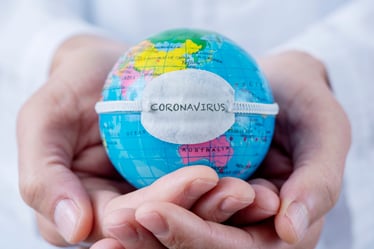 As news of the coronavirus disease 2019, or COVID-19, outbreak has increasingly dominated headlines, we are prepared to support members and their family members who may be experiencing higher levels of stress and anxiety as a result.
As news of the coronavirus disease 2019, or COVID-19, outbreak has increasingly dominated headlines, we are prepared to support members and their family members who may be experiencing higher levels of stress and anxiety as a result.
Our approach in working with those struggling with these emotions is to encourage them to:
- Be informed
- Help them gain and retain perspective
- Equip them with tools to manage stress and cultivate health and resiliency
- Encourage them to seek additional support when needed
Coronavirus Disease: Staying Informed While Keeping Perspective
As COVID-19 has grown into a worldwide pandemic, ongoing news reports about its spread may give rise to feelings of stress, anxiety and fear of the future in some people. Such responses are understandable, given the disease's fast rate of infection and unknown severity. For those individuals with family and friends in affected areas or who work in healthcare settings, these feelings may be more intense.
Working with VITAL WorkLife to help manage your fear and anxiety around the spread of the disease can start with getting information about the facts and realities of COVID-19, as well as getting the support you need to develop resiliency during times of stress, and to avoid fixating on the worst-case scenario.
What is COVID-19?
According to the CDC, COVID-19 virus is a respiratory disease caused by a novel coronavirus that was first detected in China. The severity of symptoms has ranged from mild to severe illness and for some death. Symptoms include fever, cough and shortness of breath and may appear 2-14 days after exposure to the virus. According to the CDC, the following list includes emergency warning signs for COVID-19, if you are experiencing any of these seek medical attention immediately, those include:
- Difficulty breathing or shortness of breath
- Constant pain or pressure in chest
- New confusion or inability to arouse
- Bluish color in the lips or face
Note: this list is not all inclusive. If you are experiencing any severe or concerning symptoms, contact your medical provider.
How is COVID-19 Transmitted?
There is currently no vaccine to prevent coronavirus disease; the best way to prevent the spread of illness is to avoid exposure. Coronavirus is spread typically from person-to-person who are either within 6 feet of one another and/or through respiratory droplets produced from an infected person when they cough or sneeze, according to the CDC.
Ways to protect yourself:
- Wash your hands often
- Avoid touching your eyes, nose and mouth
- Avoid close contact with others –especially those who are sick; put distance between yourself and others
Ways to protect others:
- Stay home if you are sick
- Cover your mouth when you cough or sneeze—and immediately wash your hands after
- Wear a face mask if you are sick
- Clean and disinfect commonly touched surface areas daily
- Practice social distancing to slow the spread of COVID-19
What You Can Do:
- Keep things in perspective. Limit worry and agitation by lessening the time you and your family spend watching or listening to upsetting media coverage. Although you'll want to keep informed remember to take a break from watching the news and focus on the things that are positive in your life and things you can control.
- Get the facts. Gather information that will help you accurately determine risks so you can take reasonable precautions. Follow recommendations from sources you trust, such as your physician, a local or state public health agency or national and international resources such as the U.S. Centers for Disease Control and the World Health Organization. These are trustworthy, data-backed resources who have your best interest, and the best interest of the public, in mind. If you work in healthcare, be sure to stay informed of and follow all safety protocols outlined by your employer. If you have questions or concerns, take them to your supervisor or human resources department.
- Stay healthy. A healthy lifestyle—including proper diet and exercise—is your best defense against any threat. Adopting hygienic habits such as washing your hands regularly will also minimize your exposure to all types of germs and disease sources. Eat healthy, avoid alcohol and drugs and take a walk or exercise. A healthy body can have a positive impact on your thoughts and emotions.
- Seek additional help from VITAL WorkLife. Individuals who feel an overwhelming nervousness, a lingering sadness or other prolonged reaction that adversely affects their life, work or relationships should consult with a trained and experienced mental health professional through VITAL WorkLife. Our licensed behavioral health consultants can help you deal with stress and anxiety and are available to you anytime, day or night.
Recommendations for Medical Professionals
Those responding to COVID-19 on the front lines, medical professionals in hospitals and healthcare clinics, are experiencing a unique set of stressors, which can take an emotional toll on you and your family. According to the CDC, there are things you can do to reduce secondary traumatic stress (STS) reactions:
- Be aware of the impact STS may have on anyone helping families after a traumatic event
- Learn the symptoms, those being, physical fatigue/illness, metal fear, withdrawal and guilt
- Give you and your family time to recover after responding to the pandemic
- Set aside time to engage in self-care activities that you enjoy such as reading or exercising
- Ask for help—speak to a counselor or peer coach from VITAL WorkLife, someone who can help process these feelings of distress
COVID-19 Resources
We have developed a dynamic dashboard of resources to support organizations, employees and their family members as we deal with these new and unprecedented stressors. Visit the page here: https://info.vitalworklife.com/covid-19-resources
Sources:
How to Protect Yourself: https://www.cdc.gov/coronavirus/2019-ncov/prepare/prevention.html
How it Spreads: https://www.cdc.gov/coronavirus/2019-ncov/prepare/transmission.html
Manage Anxiety and Stress: https://www.cdc.gov/coronavirus/2019-ncov/prepare/managing-stress-anxiety.html
Information for Healthcare Professionals: https://www.cdc.gov/coronavirus/2019-ncov/hcp/index.html
If you are at Higher Risk: https://www.cdc.gov/coronavirus/2019-ncov/specific-groups/high-risk-complications.html


